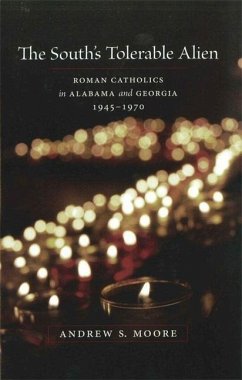This new study argues persuasively that until the 1960s religion rivaled race as a boundary separating people in the South's Bible Belt. However, the civil rights movement contributed to social and political realignments along racial lines, causing a decline in anti-Catholicism. In a region marked by religious prejudice against them, Catholics refused to shrink from public view. Moore describes the separate subculture they created after World War II and explains how it sustained their religious identity as they marked out public sacred space from which they could engage their Protestant critics.
Hinweis: Dieser Artikel kann nur an eine deutsche Lieferadresse ausgeliefert werden.
Hinweis: Dieser Artikel kann nur an eine deutsche Lieferadresse ausgeliefert werden.

